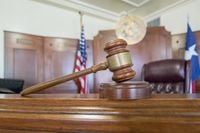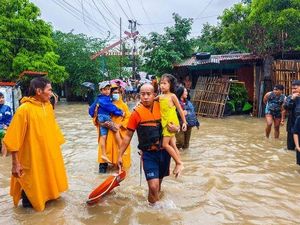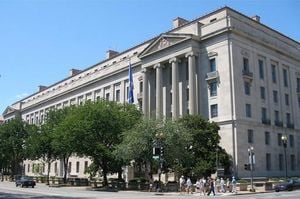In the summer of 2025, America’s cities became the battlegrounds for a dramatic clash over immigration enforcement and federal power, with President Donald Trump’s administration at the center of a nationwide controversy. Sweeping federal interventions in Washington, D.C. and Los Angeles ignited lawsuits, court rulings, and a flurry of public debate about the rights of local governments and the people living within their borders.
It all began in August, when President Trump declared a "crime emergency" in the nation’s capital. According to the Associated Press, this declaration led to a federal takeover of the D.C. police department, with thousands of federal officers and National Guard members flooding the city. The result was a wave of arrests—many more than anyone had anticipated. But what surprised many observers was the nature of those arrests: more than 40 percent were related to immigration, not crime, as reported by AP.
The crackdown quickly drew legal fire. On September 25, four individuals, joined by the national immigration rights group CASA, filed a lawsuit in the United States District Court for the District of Columbia. Their claim? That federal immigration officers had ignored key legal safeguards when making arrests during the takeover. The suit, as described by The Washington Post, alleges that agents failed to ask about people’s legal status or assess whether they posed a flight risk before arresting them—steps required by federal law for warrantless immigration arrests.
Consider the case of Jose Escobar Molina, one of the plaintiffs. On the morning of August 21, Escobar Molina was outside his D.C. apartment when plainclothes federal agents approached and immediately handcuffed him. He had lived in the city for 25 years and held valid Temporary Protected Status for El Salvador since 2001. Yet, as the lawsuit details, officers never asked for his name, identification, or immigration status. When he tried to explain his legal status, one officer allegedly dismissed him, saying, "No you don't. You are illegal." Escobar Molina persisted, telling officers he had "papers," only to be met with a shouted, "Shut up, bitch! You're illegal." Only after a night in detention did an Immigration and Customs Enforcement supervisor confirm his legal status and release him.
Another plaintiff, identified only as "N.S." in court documents, faced a similar ordeal. Arrested in a Home Depot parking lot, N.S. was pulled from his car, handcuffed, and placed in a van without any questions about his community ties or legal situation. He spent nearly four weeks in immigration detention, despite having a pending asylum application after fleeing Venezuela. The lawsuit contends that in both cases—and in many others—federal officers failed to make the individualized assessments the law requires.
CASA Legal Director Ama Frimpong, speaking to The Washington Post, put it bluntly: "They're not even doing the bare minimum as far as asking individual questions about a person's immigration status." The law, Frimpong emphasized, is supposed to protect people from wrongful arrest and detention. But in the heat of Trump’s mass deportation push, those protections, she argued, were being cast aside.
The Department of Homeland Security (DHS) pushed back hard. On September 26, DHS took to social media to denounce the lawsuit’s claims as "disgusting, reckless, and categorically FALSE." The agency insisted that its officers rely on "reasonable suspicion" to make arrests and do not conduct "indiscriminate stops." Yet the lawsuit’s core question, as legal experts note, isn’t about the stops themselves—but about whether officers had the "probable cause" necessary for warrantless arrests, a higher legal standard.
While the drama unfolded in D.C., Los Angeles was experiencing its own federal incursion. Back in June, President Trump had deployed roughly 4,000 California National Guard members to the city, citing fears of riots amid protests against federal immigration raids. The move left many undocumented residents and their families terrified, as reported by AP. Although most troops were withdrawn by mid-summer, around 300 remained as of late September.
The legality of the Los Angeles deployment was quickly challenged. On September 12, a federal court in California ruled the federal takeover unlawful, citing the lack of consent from Mayor Karen Bass and violations of the Posse Comitatus Act—a law that restricts the use of the military in domestic law enforcement. Mayor Bass, who had refused to approve the occupation, made her position clear on X (formerly Twitter): "You don’t deploy the armed forces because of people’s feelings," she wrote. "The military is not a tool to make people feel better."
The court’s ruling, though, was limited to Los Angeles, reflecting the city’s unique circumstances, including the treatment of protestors and breaches of local authority. The Trump administration was given until September 12 to appeal the decision, and President Trump did not rule out sending troops back to Los Angeles in the future. For now, the legal precedent stands as a check on similar federal actions—at least in California.
But the White House seemed undeterred. Even as legal battles raged, President Trump hinted at further federal interventions in other cities. During a September 2 press event, he cited recent violence in Chicago—"nine people were killed in Chicago and 54 were badly wounded with bullets"—and declared, "We have to do something." New York, too, found itself in Trump’s crosshairs. After the 2025 mayoral primary, Trump criticized frontrunner Zohran Mamdani as a "communist" during a cabinet meeting, and later told Fox5 New York, "We have other cities that are very bad. New York has a problem. We’re not going to let it happen. We’re not going to lose our cities over this. And this will go further."
These comments sent a chill through many urban communities, especially among undocumented residents and activists. In Los Angeles, the deployment had already "upended numerous undocumented residents and families, and created an uneasy environment for its locals," as AP reported. In D.C., the lawsuit’s plaintiffs said they now live in fear of being arrested and detained again, even though they have legal status or pending immigration cases.
Local officials, too, voiced their opposition. D.C. Mayor Muriel Bowser, a Democrat, pointed to a significant drop in physical offenses in her city and questioned the need for a federal "occupation." The city’s attorney general, Brian Schwalb, went further, calling the surge of troops an "involuntary military occupation."
As the legal and political battles play out, American cities remain on edge. The Trump administration’s aggressive approach to immigration enforcement and urban crime has sparked a fierce debate about federal power, local autonomy, and the rights of immigrants—one that shows no signs of fading as the 2026 election season approaches.
For now, the fate of these federal interventions hangs in the balance, with lawsuits and court rulings shaping the boundaries of presidential power. The experiences of D.C. and Los Angeles serve as stark reminders of what’s at stake when federal authority collides with local communities—and the people caught in the middle.




